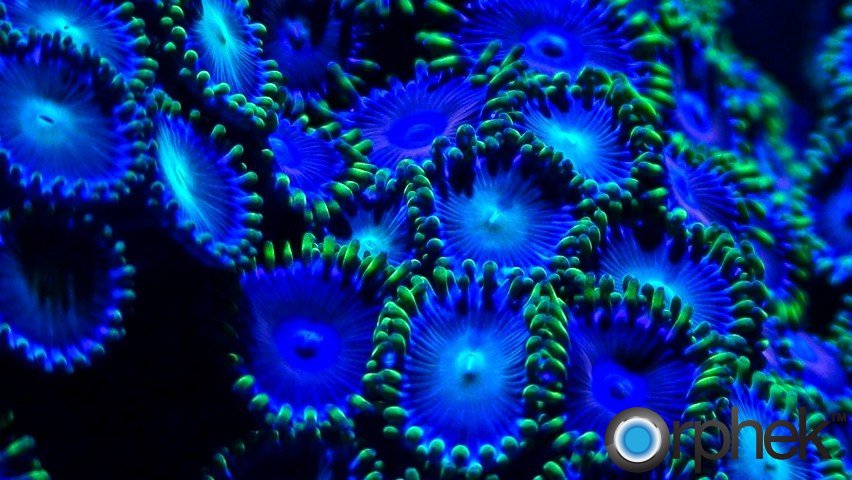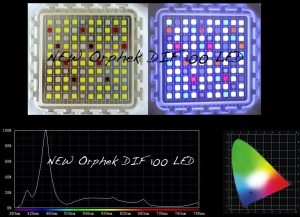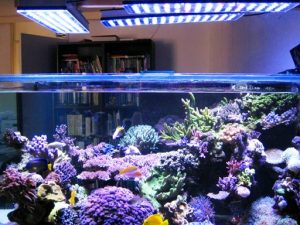Is UV light a gimmick in LED Fixtures, or do corals benefit by it?
UV light can be dangerous to all biological life including us humans so we will first explain the different wavelengths of UV light and their effects.
UV-A – 315-400nm
UVA is the most commonly found form of UV, and is responsible for the tanning effect we see in our skin after time spent in sunlight. UV-A can cause sunburn if exposure is excessive and the atmosphere does very little to block this range of UV.
UV-B – 280-315nm
UVB is the most dangerous of all forms of UV light. It possesses enough energy to wreak havoc on cellular DNA cells but not enough to be absorbed by our atmosphere like UV-C.
Overcast or cloudy skies are not enough protection from this type of UV light.
UV-C – 200-280nm
This light is relatively safe to us because our atmosphere absorbs these rays. UV-C is found on germicidal lamps and UV sterilizers where it will destroy any biological life it comes in contact with.
Is UV Light Safe For Corals?
The answer is yes and it is beneficial to corals providing it is emitted at safe levels. Metal halide and especially HQI lamps all emit much UV-A and must be filtered out by a glass or acrylic cover or corals face the possibility of bleaching as the Zooxanthellae cannot adjust to this light at a very fast pace. Since corals need sunlight to make food, most live in shallow waters near the ocean’s surface which exposes them to UV-A and UV-B rays. Fortunately corals have the ability to make their own sunscreen to protect them and allow only high and safe ranges of UV which is beneficial to the Zooxanthellae that reside in the corals which provide food to them by way of photosynthesis. This is one of the concerns with our ozone layer slowly being reduced. The ozone filters out the dangerous UV-C rays which would otherwise kill the corals as they cannot produce enough sunscreen to protect them from these type UV rays.
Unlike metal halide lamps, LEDs in the 400-700nm range that are used in aquarium fixtures do not emit UV radiation and that is one of the reasons Orphek now incorporates high range UV-A LEDs in their systems. The beauty of this is that unlike metal halide/HQI lamps, the UV-A output can be controlled thereby providing safe and beneficial levels for the corals while still bringing out the beautiful fluorescence of the corals. Orphek’s UV LEDs are in the range of 380-400nm which enters the visible range which produce a small amount of UV yielding a bluish purple light causing the corals to fluoresce while improving photosynthesis within the corals.

Corals fluorescing under Orphek LED Lighting using UV LEDs
When switching to a high PAR/PUR Orphek pendant, you may notice that your corals may close up their polyps or shrink back. This is a self protective reaction to the change of light, both in intensity and spectral quality. Within a few days you will notice the color of the coral may change depending on its former lighting source. This change in color actually comes from the Zooxanthellae which reside in the coral. These algae are adapting to the change in ultraviolet light by changing how much UV light they can absorb, and this adaptation is reflected visually as color.
It is not uncommon for corals with bright colors to adjust to the lower UV-A light found in Orphek LED fixtures which incorporate UV LEDs. The possible loss of some colorful pigmentation is not necessarily a sign of unhealthy coral; the corals are just adjusting to their new environment and will be very colorful.
Orphek DIF100-XP multi-chip with UV LEDs.
All DIF- XP series have UV LEDs in a proportional amount.
The PR156-XP also uses UV LEDs
Orphek has spent a considerable amount of time testing our UV LEDs with different species of corals to ensure that the UV range is safe and beneficial for corals. The UV LEDs Orphek incorporates into their systems are safe for humans and will cause no damage to your eye sight. UV in this range has been tested by NASA and proven to be safe for humans.


